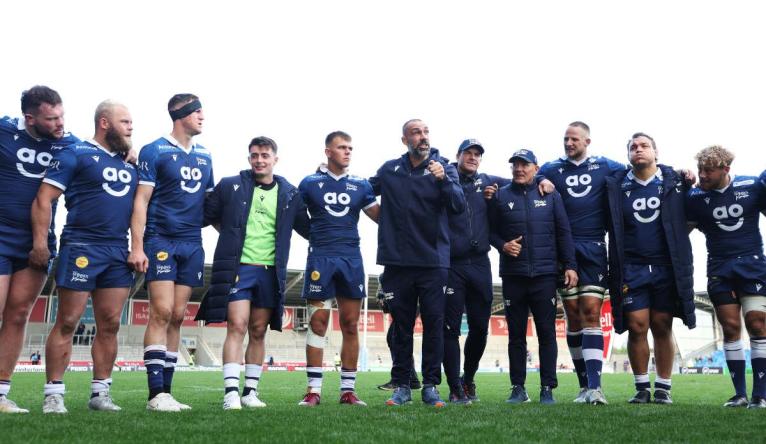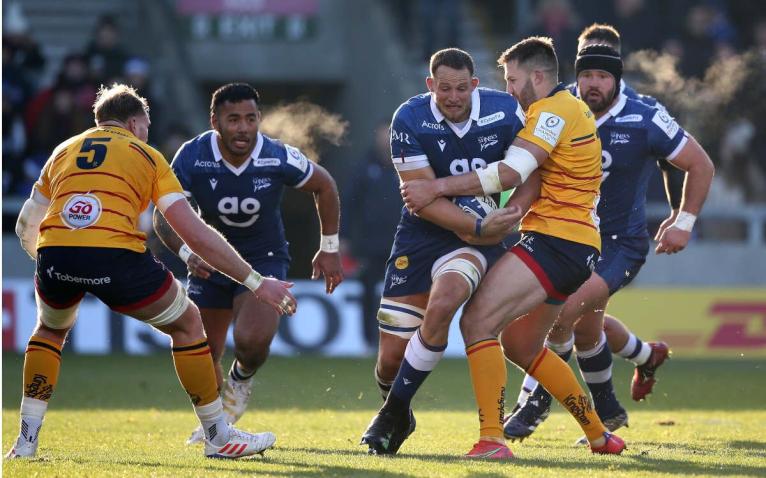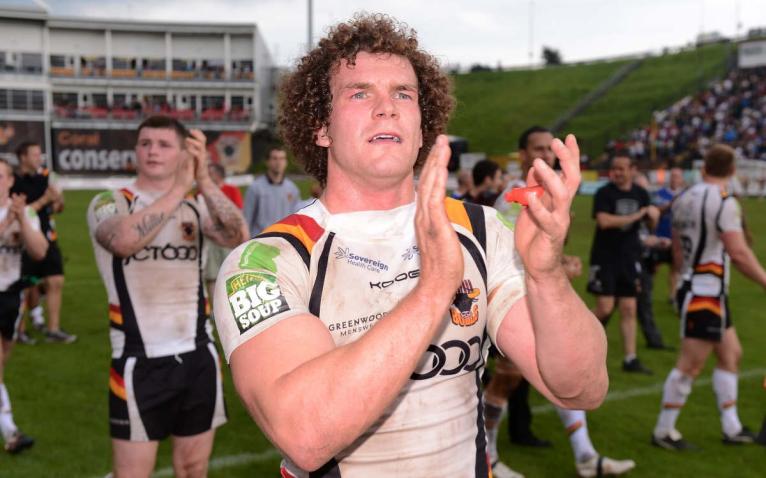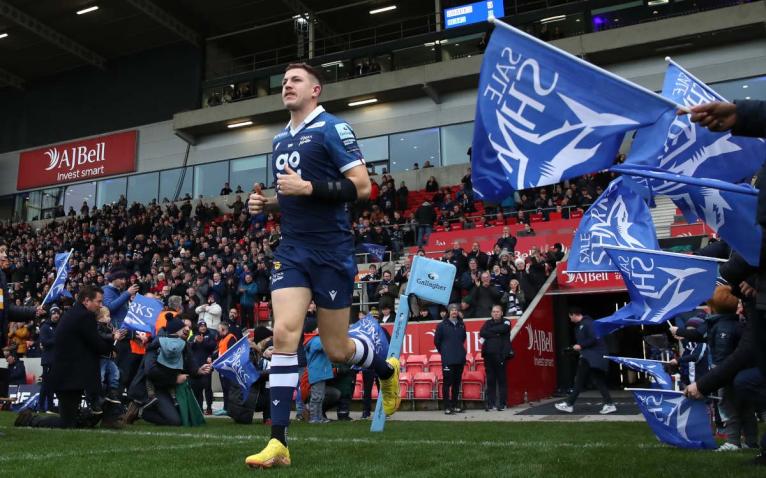Alex Sanderson is pondering aloud the nature of his spirituality. It is not a traditional pastime for a director of rugby, certainly not in front of a journalist. Things take a poetic turn.
“The skin is not the outside of you when you’re communicating,” declares the Sale boss excitedly. “People think you stop with your facial expressions and your voice intonation. You don’t. There’s more to your communication than that. You can affect the person next to you without communicating per se.”
And that, in a slightly quirky nutshell, is Sanderson’s philosophy at the Sharks. He is making it his mission to understand the subtle interactions and methods that can affect player mood, motivation and morale. Accomplish that and the holy grail of sporting success – consistency of performance from match to match – falls within a team’s grasp.
To some sporting traditionalists it might sound a bit New Age; a psychology for a Californian meditation class rather than for a proudly abrasive rugby team. But, in effect, Sanderson wants to do what every manager in any walk of life wants to do: capture the essence of what makes a winning group of people more than the sum of its parts. An element of that, he believes, comes through group bonding that stimulates a hormone – oxytocin – which in turn makes players work harder for one another. As coaching manifestos go, it is a heady blend of science and spirituality.
“I’d say we’re pretty spiritual people,” he says, nodding towards the Sharks’ peak performance coach, Jamie Langley, who is beaming from behind a beanie hat. “I’m not talking about religion here but agnostic beliefs.”
It’s pretty intense stuff. And it’s most definitely not your usual chinwag with a couple of rugby coaches. More spiritual retreat than journalistic interview, you might say. But then Sanderson and Sale revel in intensity. Their game plan is unwaveringly physical, emphasising dominant defensive collisions, destructive ball-carrying, and a granite-hewn set piece. So it is of more than passing interest to hear how openly spiritual elements off the field underpin the uncompromisingly combative elements on it.

The Victorians had their Muscular Christianity. Sanderson, Langley and Co are implementing a modern version: big on the muscles, big on meditation, and big too on the science that helps them understand the dynamics of team bonding.
To arrive in this corner of Manchester is to encounter a new lexicon of sporting terminology. Sanderson and Langley talk of psychological safety, co-regulation, autonomy, emotional load, anchoring, epigenetics and the quest for self-awareness. There is frequent mention of “black swan moments” and US military-style “hot debriefings”. In one conversation, Sanderson talks about rugby’s financial issues leaving his head “somewhere in the Nile”. It is hard to imagine Steve Diamond, Sanderson’s predecessor, having much truck with some of the vocabulary and the vision. And Sid Sutton, the club’s chief executive, admits that some staff, both on-field and off-field, have left due to not seeing eye-to-eye with the Sharks’ new culture.
Many coaches have had mantras and buzz words. Sir Clive Woodward took England to a World Cup triumph with T-CUP – Thinking Correctly Under Pressure. But there are other mantras too, some with a heavy dose of realism to temper the giddy abstractions. To quote one example from the Brooklyn philosopher Mike Tyson: “Everyone’s got a plan until they get punched in the mouth.”
When I arrived here there was little or no investment at the psychological level and the players needed it. They needed to be upskilled. There was a blank canvas here.
Alex Sanderson
But Sale are very much punching in the metaphorical sense at the moment, notwithstanding a recent schooling by Toulouse in France. Just ask Ulster, who are no doubt still nursing bruises from their nilling. Domestically, the Sharks sit second in the Premiership. And such punching is why Sanderson’s Brave New World merits further investigation rather than being dismissed as coaching/self-help mumbo-jumbo.
Speaking of which, Brave New World is in fact a handy book from which to consider what Sanderson and CEO Sutton are trying to achieve at Sale. Aldous Huxley’s classic novel centres on a protagonist trying to break free from a dictatorial state that seeks to hold citizens in a state of infantile servitude. Similarly, Sale are on a mission to give players greater powers of self-reflection and a louder voice, a voice which is intended to make everyone feel more connected to those around them at the club – as well as to themselves.
Sanderson, who was appointed almost two years ago to succeed Diamond, recalls: “When I arrived here there was little or no investment at the psychological level and the players needed it. They needed to be upskilled. There was a blank canvas here.
“It was a bit of quest for self-awareness to begin with. This was a group that had been told how to feel basically; it was a different environment. That’s not to say it was a bad one. An autocratic culture can be successful but it has a finite shelf-life, I think. The best players and teams I’ve worked with are more intrinsically motivated. For that, you need self-awareness.”

Sale chief executive Sutton says he had a huge pile of applications for the director of rugby role but only interviewed Sanderson. “We had a culture that was quite suppressive and I wanted to change it from suppressive to expressive, because if you allow people to have opinions and to give feedback then that’s for the greater good,” he says.
“I want people working through an energy of creativity and freedom, not an energy of fear. One where you can let go of mistakes.
“The hurdles when I joined were that there was a very old philosophy that you had to be very brutal, you had to be this dictator, you had to have a sort of parent-child relationship. They (players) could not think for themselves.
“But it’s not all fluffy and woolly now. People still have to deliver. It’s not about taking away any of the edge, it’s about making more edge – and supporting players to be the best they can be at the top of their game.”
The person tasked with developing that extra edge is former Great Britain rugby league international Langley. He is a man with a welcoming demeanour, passing favourable judgment on my salmon pink jumper. Langley is one half of an infectious energy-boosting double act. He and Sanderson bounce off one another, taking it in turns to tell the tale of how the Sharks have embraced the philosophy of mental preparedness. It is an approach which views mental resilience as a practical skill that is on the same level as on-field decision-making, and one that also requires dedicated training
When the bullets are firing out there on the field and you need a moment of clarity or conciseness, then players can use the breathing techniques to regulate their nervous system
Jamie Langley
Langers, as Sanderson calls him, has several buzz phrases. One is “needle movers”, by which he means the changes to a side’s mental preparation that most impact their performance. He oversees the club’s Mind Gym, a building where players meditate and do yoga.
For Langley, a key component is breathing exercises. Another is around effective sleeping. A third component is supporting players to have an optimistic mindset which enables them to see unexpected issues as challenges rather than setbacks. All are intended to bolster the players’ resilience, which in turn aids performance.
Players are put into “shivers” – or small groups of Sharks – where they bare their sporting souls. These reflection sessions are intended to build both self-understanding and the sense of belonging that will bind them closer to their team-mates.
“The best coaches and teachers are always intuitively decades ahead of the science,” says Langley. “A lot of the practices we use are backed up by science. We’ve got clinical evidence that underpins what we’re doing, but a lot comes from a spiritualistic, intuitive level as well.
“When the bullets are firing out there on the field and you need a moment of clarity or conciseness, then players can use the breathing techniques to regulate their nervous system.

“And being optimistic helps you recover from stress much better. If you’re able to approach chaotic events with a more optimistic mindset in that moment then you’re going to come up with better solutions. So, you’ll get fewer players saying they lost their head and fewer players kicking stones for 10 minutes because they can’t get over something. That’s what gets me going.
“The players have quite a lot of autonomy over the programme – the content, the day’s schedule. It’s about finding the one, two percent needle movers here and there within the group. With autonomy you get a sense of belonging, and if you feel like you belong to the tribe you’re going to contribute a lot more to it. It comes back to evolutionary behaviour and we try and tap into that. If we understand the neurobiology we can cater to that within our sessions.”
Which brings us back to the hormones. A team of neuroscientists from Manchester Metropolitan University is currently monitoring players’ levels of ‘happy hormone’ oxytocin, a hormone released through social bonding and which can counter stress. By monitoring these levels – and those of other hormones – the Sale coaching team wants to put its coaching techniques on a scientific footing.
Sport, for Sanderson, is about helping people grow. And, in fact, the rugby is an almost incidental element. Rugby, the Sale coach admits, can get a tad boring.
Sanderson concedes that some of his concepts prompt the odd raised eyebrow with players.
“You can misconstrue it as being quite wishy-washy,” he admits. “I don’t believe they are. We know they work. But you try telling a stoic South African who’s not been in this environment very long that psychological safety breeds trust, that trust builds team, and that the stronger the team the harder you’ll work… He’ll be like, ‘I get it but let’s have less talk and let me run through a wall’. So if we then bring in a doctor of neuroscience who tells them matter of factly that we’re not that far removed from Cheddar Man and that trust farms oxytocin and that oxytocin makes you work harder for longer, then that makes it less based on faith.
“A decent coach will be able to feel it. But some will need hard evidence. And, anyway, I like all the science. If you can measure things you can see your progression or degradation.”
But for all the neuroscience there is a recurring deep seam of spirituality in the Sharks’ coaching outlook. There is something of the Christian mystical tradition – of paradoxically finding one’s purpose by letting go of one’s ego. There is a thread of Hinduism, too, with Sanderson a believer in karma. And while it’s reasonably safe to say it probably wasn’t written with rugby in mind, the Lao Tzu, a classic text of Taoism, goes a fair way to capturing the Sharks’ current tack: “He who knows himself has discernment. He who overcomes others has force; He who overcomes himself is strong… He who perseveres is a man of purpose.”
Spending time with the leaders at Sale prompts questions about sport’s purpose. Just what is its ultimate point? The purist’s response is often that sport is an end in itself; one of those rare things in life where the participants are liberated from humdrum concerns and elevated to a space where they do something for its own sake – much like staring at a beautiful picture. But that’s not quite the Sale stance. Sport, for Sanderson, is about helping people grow. And, in fact, the rugby is an almost incidental element. Rugby, Sanderson admits, can get a tad boring.

“We do what we do as coaches because we like and enjoy going on a growth cycle with people and players,” he says. “That’s what motivates us. If you’ve been involved with rugby for 30 years like I have, the game is the game and it can get a little bit dull, but the people are the constantly changing challenge. You’re privileged enough to spend a decent bit of time with them and go on that growth with them, which is the buzz.”
If Sanderson at times sounds like a sage, he looks the part too; his beard long and flecked with grey, his eyes a blend of intensity and warmth. But as a former international flanker himself, he doesn’t kid himself that players are in a state of zen nothingness when on the field; nor does he want that.
“You might think that being in control or being self-aware is to be almost emotionally neutral but it’s not the case, especially not with these boys. It’s about how you accept whatever emotion you’re feeling, and being able to channel it or park it.
“If you’re not psychologically safe enough, if you don’t talk about your feelings in order to create self-awareness, you’re not going to understand your purpose and have the benefit of that for yourself and your team-mates.
“Mental preparedness, reflection and resilience is the one area where you can make the most strides in rugby, which is a game that has general equality in and around strength and conditioning, diet, and everything else. I believe this is the area where you can find the edge and get ahead of other teams.”
To some, it may remain too abstract. There may well be some South Africans in the Sale ranks who still just want to cut the talk, eat their protein and run through brick walls. But sports needs its thinkers, its mavericks, its philosopher-sharks; the people who are prepared to defy the mainstream, swim into unchartered waters and do things that little bit differently. And underpinning Sanderson’s philosophy is a streak of hope and humility that few would wish to stifle.
“The reason why I put this much effort into culture and environment is because I do believe there’s hidden potential in everyone,” he says. “Myself included.”



Comments
Join free and tell us what you really think!
Sign up for free